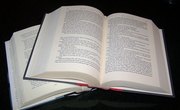If you're studying the humanities or are in a liberal arts program, chances are you'll need to learn MLA formatting. The seemingly ubiquitous MLA gets its name from the Modern Language Association, a professional body devoted to the study of language and literature. When you write an argumentative essay that uses quotes as evidence, MLA format is as much a matter of including the quote fluidly as it as a matter of punctuation and indentation. This guide will provide you with MLA rules and show examples of how to apply those rules to make your essay as convincing and readable as possible.
Where Did You Find Those Quotes?
Cite your source at the end of each quote. Within parentheses, provide the author's last name and the page number from which you took the quote; do not include the name as part of the parenthetical citation if you have already used his name in your introduction of the quotation. If the quote is taken from consecutive pages, include both page numbers within the citation: (Berger 20-21). If you are quoting from a source other than a book, such as a website, documentary, or interview, you may want to look further into MLA citation convention has a strict protocol for how to cite each type of source.
Example: Daisy Buchanan's voice is described as "full of money" (Fitzgerald 23).
Introducing Quotations
Introduce the quote according to what purpose it serves in the original text and in your essay. This process can involve letting the quote flow naturally with the rest of your text, as in this example:
Though a reproduction may be meticulously accurate, "the meaning of the original work no longer lies in what it uniquely says but in what it uniquely is" (Berger 21).
If you allow the quote's originator to state the quote for you, use the present tense when introducing quotes and omit the author's name from the parenthetical citation:
Even if a reproduction is well-executed, as Berger asserts, "the meaning of the original work no longer lies in what it uniquely says but in what it uniquely is" ( 21).
How you choose to introduce a quote is entirely up to you, but be sure that your introduction doesn't contribute to the quote being taken out of context. If the quote doesn't fit your argument, either find another source or change your argument.
Punctuating Quotations
Punctuate the quote correctly. Use double quotation marks for the quote itself and, where applicable, single quotation marks for quotes within the quote. You may include a question mark or exclamation mark within the quotation marks if they are part of the original text. All other punctuation should be located after the citation.
Here are a few examples of correctly cited and punctuated quotations:
Poking fun at his fellow writers, Vonnegut observes that "they love to stay up all night, arguing the question, 'What is science fiction?'" (2).
Though Vonnegut is fond of his colleagues, when he observes that, "they love to stay up all night, arguing the question 'What is science fiction?'" (2), he clearly finds their banter absurd.
If you're quoting poetry, indicate line breaks with a slash, for example, "Type of the antique Rome! Rich reliquary / Of lofty contemplation left to time" (Poe 948).
Including Longer Quotations
Indent passages of prose four lines or longer and passages of poetry three lines or longer. Make your margins one inch narrower on the left and right sides of the passage. Note that the punctuation rules change somewhat for longer passages, as they do not require quotation marks and their citation is placed after the end punctuation. For example, if I were to quote from Edgar Allan Poe's poem "The Bells," I'd indent it one inch on each side and type the text as follows:
He smiled understandingly-much more than understandingly. It was one of those rare smiles with a quality of eternal reassurance in it, that you may come across four or five times in life. It faced--or seemed to face--the whole eternal world for an instant, and then concentrated on you with an irresistible prejudice in your favor. It understood you just as far as you wanted to be understood, believed in you as you would like to believe in yourself, and assured you that it had precisely the impression of you that, at your best, you hoped to convey. (Fitzgerald 54)
Checking Your Work
Plagiarism is a grievous error and can result in academic penalties. Be careful you don't accidentally plagiarize. To do this, read over your paper to make sure your work is your own. Double check your quotations. You can even run your paper through a free plagiarism checker online.
Related Articles
References
Tips
- Visit a website dealing with MLA style for further formatting tips.
- Sign up for a session at your school's Writing Workshop if you are still having difficulty.
Warnings
- Always double- and triple-check your quotations to avoid inadvertently plagiarizing content.
Writer Bio
Since 2003, Momi Awana's writing has been featured in "The Hawaii Independent," "Tradewinds" and "Eternal Portraits." She served as a communications specialist at the Hawaii State Legislature and currently teaches writing classes at her library. Awana holds a Master of Arts in English from University of Hawaii, Mānoa.









